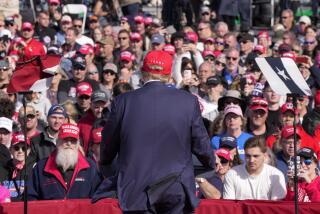‘LBJ’ and ‘Darkest Hour’ show how democracy in action can sometimes be a beautiful thing to behold
Most movies about politicians depict either slippery narcissists — “Nixon,” “The Deal” (about Tony Blair), “Game Change” (Sarah Palin), this spring’s “Chappaquiddick” (Ted Kennedy) — or complicated personalities driven to achieve the greater good, as in “Lincoln” and the Franklin Roosevelt love story “Hyde Park on Hudson.”
This year, “LBJ” and “Darkest Hour” dramatize how American President Lyndon Baines Johnson (Woody Harrelson) and British Prime Minister Winston Churchill (Gary Oldman) transcended personal demons to lead their countries through perilous times. Written before the 2016 election, both films offer heartening reminders that democracy in action can sometimes be a beautiful thing to behold.
WATCH: Video Q&A’s from this season’s hottest contenders »
“Darkest Hour” writer-producer Anthony McCarten, who built his script around three 1940 Churchill speeches that galvanized the British people to resist Adolf Hitler’s fast-approaching Nazi juggernaut, marvels at the prime minister’s mastery of language, particularly for a man riddled with uncertainty and doubt. “What separates Winston Churchill as a leader from contemporary politicians, and most politicians throughout history, is that he had an astonishing ability with words,” McCarten says. “His life seemed to be devoted to the proposition that words can be tasked with the job of persuading people towards a certain course of action. Churchill spent a lifetime perfecting that skill, which found a perfect forum in May 1940.”
In addition to his uncommon eloquence, sense of humor and “audacity,” McCarten says, Churchill stood out from the pack because he abhorred lying. “By nature, Churchill was incapable of deceit, sometimes to the detriment of his own career,” McCarten says. “Even when the news was bad, he told the people the truth.” By contrast, McCarten observes, “Truth and untruth, right now, are given almost equal authority. In the age of tweetdom, we have to be vigilant and call people out when language is abused because trust can be broken very quickly, but it takes a long time to repair it.”
If Churchill changed the course of history by galvanizing public sentiment with brilliant rhetoric, “LBJ’s” Johnson pushed through the landmark 1964 Civil Rights Act with his genius for backroom negotiations. Though he never wrote a book about it, Johnson had mastered the art of the deal in the corridors of Congress by the time he became the United States’ 36th president following John F. Kennedy’s assassination.
“LBJ” director Rob Reiner says, “He cajoled, he sweet-talked, he twisted arms, he reached across the aisle, he used all these tools to push for civil rights. People think of Johnson as this boorish bull in the china shop, but he possessed enormous skill as a lawmaker. LBJ understood, in his bones, the nexus between policy, politics and government as opposed to the guy in the White House now, who does not understand how government works and has no interest in learning.”
Like Churchill, a heavy drinker given to bouts of “Black Dog” depression, Johnson suffered from self-doubt and would soon be brought low by his catastrophic decision to escalate the Vietnam War. But during their finest hours, both leaders set aside personal foibles and partisan concerns to preserve democracy.
“LBJ was deeply insecure,” Reiner says. “He wasn’t good-looking like the Kennedys and had recurring nightmares about being paralyzed. As much as he championed civil rights and the war on poverty, Johnson wanted to achieve those things so the American people would love him. On some level, all politicians are narcissists. Look at Lincoln, Teddy Roosevelt, Churchill — many great leaders have all kinds of character flaws, but at least they understood how to get things done. Right now, it seems we only have the character flaws, without any of the functionality.”
More to Read
From the Oscars to the Emmys.
Get the Envelope newsletter for exclusive awards season coverage, behind-the-scenes stories from the Envelope podcast and columnist Glenn Whipp’s must-read analysis.
You may occasionally receive promotional content from the Los Angeles Times.






